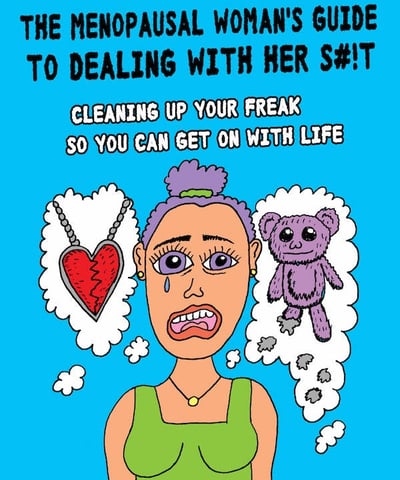Menopause Mood Swings: How to Cope
Is your wild mood ruining your life? Find out how to cope with mood swings during menopause, from self-care techniques to medical and community support.
MENOPAUSAL DEPRESSIONMENOPAUSAL SYMPTOMS
Kennerly Clay
5/29/20245 min read


How to cope with mood swings during menopause?
Many women in menopause feel like they've been blindsided with symptoms like low mood, fatigue and irritability, then run over by a truck full of rage, low libido, and depression. The primary driver behind these mood swings is the fluctuating hormone levels that occur during this phase.
As estrogen and progesterone levels rise and fall unpredictably, they directly influence your brain's chemistry, particularly affecting neurotransmitters like serotonin and dopamine. This hormonal upheaval can lead to sudden changes in mood, ranging from heightened irritability to bouts of sadness or even unexplained euphoria—while you're coping with menopause depression.. Such is the world of menopause and mental health.
Menopausal mood swings can make you feel like you're losing your freaking mind, causing emotional highs and lows that can be both bewildering and exhausting. Yet it's important to note that mood swings are a very common aspect of the menopausal journey.
According to the North American Menopause Society (NAMS), up to 75% of women report experiencing mood changes during menopause. These fluctuations are not just a figment of the imagination but are rooted in biological changes the body undergoes. It's helpful to understand this as it helps normalize the experience and validates the emotional turbulence many undergo.
Ways to manage mood swings
Managing mood swings can be challenging, especially if you're coping with menopause depression to boot, but adopting certain lifestyle changes can significantly help in stabilizing emotions. One of the most effective strategies is maintaining a balanced diet. Consuming foods rich in vitamins and minerals, particularly those high in Vitamin B, magnesium, and omega-3 fatty acids, can positively influence mood. Incorporating plenty of fruits, vegetables, whole grains, and lean proteins into your diet is essential.
Physical activity (when you don't feel like it)
Regular physical activity is another crucial factor. Engaging in exercises such as walking, swimming, or yoga not only boosts physical health but also releases endorphins, which are natural mood lifters. Yoga and meditation can also be particularly beneficial, as they promote relaxation and mental clarity, helping to alleviate stress and anxiety.
What about when you don't feel like moving?
This was me, most of the time. And who the hell gets 10,000 steps a day, consistently? Not I. So I had to reframe things. Think about housework as physical exercise. Projects you're working on at home can help you increase your activity level. I found getting up and dancing for five minutes in the middle of my work day was incredibly satisfying - and fulfilled my activity requirements in the face of overwhelming weight gain.
Three a.m. wake-ups and the quality sleep conundrum
Quality sleep is fundamental to emotional well-being and mental health in menopause. Establishing a regular sleep routine and creating a restful environment can improve sleep patterns. Avoiding caffeine and electronic devices before bedtime can also enhance sleep quality. If you can't stay off the electronics, consider listening to an audiobook or a bedtime story or a lengthy meditation via an app like Calm.
Self-care is where it's at
Self-care routines should not be overlooked. If I could offer one piece of advice to my pre- and perimenopausal self, it would be: Start putting yourself first. No fucking kidding around. You will suffer immeasurably if you don't learn this critical lesson now.
Simple practices like taking a warm bath, engaging in a hobby, or spending time in nature can provide much-needed relief. Don’t hesitate to indulge in your favorite TV shows or treat yourself to a spa day – sometimes, laughter and relaxation are the best remedies.
Plug in with family, friends and a support community
Staying socially connected is vital. Social interactions can provide emotional support and a sense of belonging. Maintain close relationships with friends and family, and don’t be afraid to seek their support when needed. Joining support groups or online forums where you can share experiences and advice with others going through the same phase can also be beneficial.
By integrating these practical strategies into daily life, it is possible to manage mood swings effectively, promoting a more balanced and positive outlook during menopause.
If you or someone you know is in crisis, please call 988, the Suicide & Crisis Lifeline in the United States.
Need a menopausal laugh?
Watch Kitty's Menopausal Meltdown on That 70s Show
When to seek professional help
While many women successfully manage mood swings during menopause through self-care techniques, there are instances where professional intervention becomes necessary. Recognizing the signs that indicate a need for expert help is crucial for maintaining mental and emotional well-being. Persistent sadness, anxiety, or mood swings that significantly interfere with daily activities are clear indicators that it's time to consult with a healthcare professional. Other menopause depression symptoms might include severe irritability, uncontrollable anger, or a sense of hopelessness and despair.
I've had all of the above - and I can't say enough about working with a mental health therapist in menopause. Therapy and counseling can be effective options for mood swings and more. Cognitive-behavioral therapy (CBT), for instance, can help you identify and challenge negative thought patterns, leading to improved emotional regulation. Licensed therapists can provide a safe space to explore feelings and develop coping strategies tailored to individual needs.
Taking the drugs
In some cases, medication may be necessary to manage severe symptoms. Antidepressants, such as selective serotonin reuptake inhibitors (SSRIs), can be prescribed to alleviate mood disturbances. Hormone replacement therapy (HRT) is another option that can help balance hormone levels and reduce mood swings. It's essential to discuss these options with a healthcare provider to determine the most appropriate and effective treatment plan.
Seeking help is a proactive step and a sign of strength, not weakness. Addressing severe mood swings through professional avenues can significantly improve your quality of life. Feeling overwhelmed is a common experience, but with the right support, coping during this challenging phase becomes more manageable.
Wanna talk more about mood swings in menopause?
Books for women who are losing it in menopause
Mental Health
Losing your mind in peri/menopause?
The menopausal woman's guide series
Financial Health
Had enough of financial insanity?
Personal Growth
Triggers? Old stuff kicking up?
Related topics
Explore helpful articles, tips, and advice for women who are losing their shit in menopause.
Community
Stay Connected
© 2024. Eclectic Content, Inc. All rights reserved.






